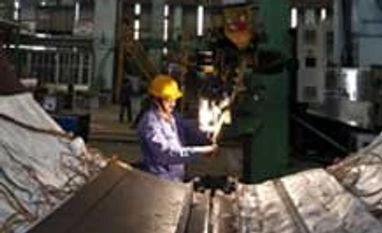Growth at China's big manufacturing companies unexpectedly stalled in July as demand at home and abroad weakened, an official survey showed on Saturday, reinforcing views that the economy needs more stimulus as it faces fresh risks from a stock market slump.
The official Purchasing Managers' Index (PMI) stood at 50.0 in July, compared to the previous month's 50.2. The 50-point mark separates growth from contraction on a monthly basis.
Analysts polled by Reuters had predicted another tepid reading of 50.2, pointing to expansion, albeit a sluggish one.
However, both export and domestic orders shrank for the large firms covered by the survey, and in response they continued to cut jobs.
It did not mention any impact from a savage 30% drop in stock markets since mid-June, though analysts said wild price swings could hit consumer and business confidence and investment decisions, adding pressure on the already cooling economy.
"It warrants more concrete policy measures to stabilise the real economy. Perhaps the funds used to prop up the share market could be used to support the real economy," ANZ economists Li-Gang Liu and Louis Lam said in a research note.
More From This Section
ANZ maintained its forecast that the central bank will cut interest rates by another 25 basis points (bps) this quarter and reduce banks' reserve requirements by 50 bps by year-end.
The government has rolled out a flurry of steps since last year to try to put a floor beneath sputtering economic growth, including accelerating infrastructure spending and repeated reductions in interest rates and banks' reserve ratio. But growth is still expected to moderate this year to around 7%, the slowest in a quarter of a century.
The statistics bureau said the weaker reading was partly due to the weather, as hot temperatures and heavy rain led some firms to reduce production and carry out maintenance.
"The recent fall in prices of oil and other commodity products also affected related industries," it added.
A preliminary, private Caixin/Markit survey last month showed activity at smaller factories contracted by the most in 15 months.
China's slowdown has already become a sharp reality check for many foreign companies doing business there and for its export-reliant Asian neighbours.
Volkswagen
South Korea on Saturday reported exports to China, its biggest customer, fell 6.4% in July from a year earlier, the sharpest decline in five months.
FAR FROM CRISIS?
The stock market plunge has stoked fears among global investors about further damage to the Chinese economy, while Beijing's unprecedented but so far unconvincing efforts to hold up share prices have led to doubts about its ability to ensure financial stability.
Market watchers fear that some companies may be facing heavy losses after speculating in stocks, although the overall amount of leverage is hard to quantify.
Still, economists at Nomura said this week that China was "far from being in a crisis scenario", and believe the share sell-off "should only have a limited negative impact on the real economy."
A similar activity survey on Saturday suggested strength in the services sector continued to offset some of the persistent weakness at factories, but there were worrying signs on that front, too.
The official non-manufacturing Purchasing Managers' Index (PMI) edged up to 53.9 in July, compared with the previous month's reading of 53.8 and pointing to solid expansion.
But services companies also reported softer orders, with the new orders sub-index falling to 50.1 in July from 51.3 in June, and firms cut jobs at a slightly faster pace.
The services sector has accounted for the bigger part of China's economic output for at least two years, with its share rising to 48.2% last year, compared with the 42.6% contribution from manufacturing and construction.
China's Politburo has promised to step up "targeted" adjustments to economic policy to foster stable growth in the world's second-largest economy, media said on Thursday.
In a rare acknowledgement of the challenges ahead, state radio quoted the decision-making body of the Communist Party as saying that China had yet to find new drivers to power its economy at a time when old engines are flagging.
)